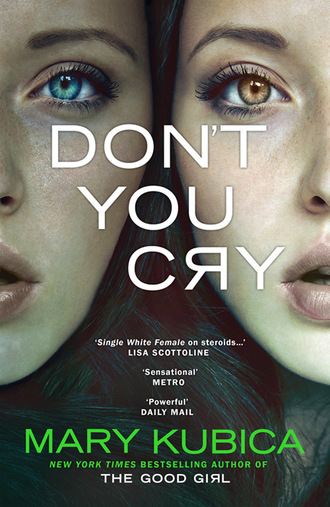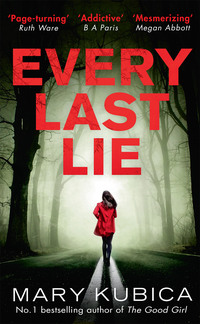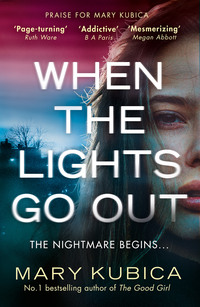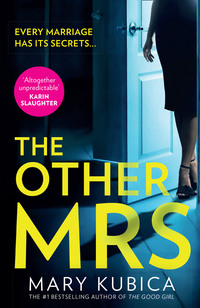
Полная версия
Don't You Cry
I put the cap back on the water; I pick up the pens. How was it that I never realized Esther was such a slob? I muse over the thought: What else don’t I know about my roomie?
And then I read the note because, of course, how could I not read the note? It’s a note, which is all sorts of stalker-ish. It’s typed—which is such an anal-retentive Saint Esther thing to do—and signed All my love, with an E and a V. All my love, EV. Esther Vaughan.
And that’s when it hits me: maybe Saint Esther isn’t such a saint, after all.
Alex
One thing should be clear: I don’t believe in ghosts.
There are logical explanations for everything: something as simple as a loose lightbulb. A faulty switch. A problem with the wiring.
I stand in the kitchen, swallowing the last of a Mountain Dew, one shoe on and one shoe off, stepping into the second of the black sneakers, when I see a spasm of light from across the street. On. Off. On. Off. Like an involuntary muscle contraction. A charley horse. A twitch, a tic.
On. Off.
And then it’s done and I’m not even sure if it happened anymore or if it was just my imagination playing tricks on me.
Pops is on the sofa when I go, his arms and legs spread out in all directions. There’s an open bottle of Canadian whiskey on the coffee table—Gibson’s Finest—the cap lost somewhere in the cushions of the sofa, or clutched in the palm of a clammy hand probably. He’s snoring, his chest rattling like an eastern diamondback. His mouth is open, head slung over the arm of the sofa so that when he finally does wake up—hungover, no doubt—he’s sure to have a kink in his neck. The stench of morning breath fills the room, exuding like car exhaust from the open mouth—nitrogen, carbon monoxide and sulfur oxides flowing into the air, making it black. Not really, but that’s the way I picture it, anyway—black—as I hold a hand to my nose so I don’t have to smell it.
Pops wears his shoes still, a pair of dark brown leather boots, the left one untied, frayed laces trailing down the side of the sofa. He wears his coat, a zippered nylon thing the color of spruce trees. The stench of old-school cologne imparts to me the details of his night, another pathetic night that would have gone scores better had he thought to remove his ring. The man has more hair than a man his age should have, cut short, and yet bushy on the tops and sides, a russet color to tag along with the ruddy skin. Other men his age are going bald, thinning hair or no hair at all. They’re getting fat, too. But not Pops. He’s a good-looking guy.
But still, even in sleep, I see defeat. He’s a defeatist, a calamity much worse for forty-five-year-old men than love handles and receding hairlines.
He’s also a drunk.
The TV is on from last night, now playing early-morning cartoons. I flip it off and head out the door, staring at the dumped home across the street where I saw the light coming just a few minutes ago. On, off. It’s a minimal traditional home, school-bus yellow, a concrete slab in place of a porch, aluminum siding, a busted roof.
No one lives in that house. No one wants to live there any more than they want to have a root canal or an appendectomy. Many winters ago, a water pipe froze and burst—or so we heard—filling the inside with water. Some of the windows are boarded up with plywood, which some of the wannabe gangs defaced. Weeds choke the yard, asphyxiating the lawn. A rain gutter hangs loosely from the fascia, its downspout now lying defunct on the lawn. Soon it will be covered with snow.
It isn’t the only house on the street that’s been abandoned, but it is the one everyone always talks about. The economy and the housing market are to blame for the other rotten, forsaken homes, the blight that abraded the rest of our homes’ value and made a once idyllic nabe now ugly.
But not this one. This one has its own story to tell.
I ram my hands into the pockets of a gray jacket and press on.
The lake this morning is angry. Waves pound the shores of the beach, sloshing water across the sand. Cold water. It can’t be more than thirty-five degrees. Warm enough that it hasn’t thought to freeze, not yet, anyway—not like last winter when the lighthouse was plastered with ice, Lake Michigan’s swell frozen midair, clinging to the edges of the wooden pier. But that was last winter. Now it’s fall. There’s still plenty of time for the lake to freeze.
I walk a body length or two away from the lake so my shoes don’t get wet. But still, they get wet. The water sprays sideways from the lake, the surf a solid four-or five-feet high. If it were summer—tourist season—the beach would be closed down, dangerous swimming conditions and rip currents to blame.
But it’s not summer. For now, the tourists are gone.
The town is quiet, some of the shops closed until spring. The sky is dark. Sunrise comes late and sunset early these days. I peer upward. There are no stars; there is no moon. They’re hidden beneath a mass of gray clouds.
The seagulls are loud. They circle overhead, visible only in the swiveling glow from the lighthouse’s lantern room. The wind whips through the air, upsetting the lake, making it hard for the gulls to fly. Not in a straight line, anyway. They float sideways. They flap their wings tenaciously and yet hover in place, going absolutely nowhere like me.
I pull my hood up over my head to keep the sand out of my hair and eyes.
As I crisscross the park, heading away from the lake, I pass the old antique carousel. I stare into the inanimate eyes of a horse, a giraffe, a zebra. A sea serpent chariot where a half dozen years ago I had my first kiss. Leigh Forney, now a freshman at the University of Michigan, studying biophysics or molecular something-or-other, or so I heard. Leigh isn’t the only one who is gone. Nick Bauer and Adam Gott are gone, too, Nick to Cal Tech and Adam to Wayne State, playing point guard for the basketball team. And then there’s Percival Allard, aka Percy, off to some Ivy League school in New Hampshire.
Everyone is gone. Everyone but me.
“You’re late,” Priddy says, the sound of a bell overhead tattling on my overdue arrival. She stands at the register, counting dollar bills into the drawer. Twelve, thirteen, fourteen... She doesn’t look up as I come in. Her hair is down, tight curls of silver rolling over the shoulders of a starched no-nonsense blouse. She’s the only one in the room who’s allowed to have hair that is let down. The waitresses who beetle around in their black-and-white uniforms, filling salt and pepper shakers, bowls of creamer, all have theirs tied back in ponytails or cornrows or braids. But not Mrs. Priddy.
I tried to call her Bronwyn once. That is, after all, her name. It says so right there on her nametag. Bronwyn Priddy. It didn’t go so well.
“Traffic,” I say, and she sniggers. On her ring finger is a wedding band, given to her by her late husband, Mr. Priddy. There’s speculation that her incessant nagging was the cause of his death. Whether or not it’s true, I can only assume. She has a mole on her face, right there in the sallow folds of skin between the mouth and the nose, a raised mole, dark brown and perfectly round, which always sports a single gray hair. It’s the mole that makes the rest of us certain Priddy is a witch. That and her maliciousness. There’s rumors that she keeps her broom in a locked storage closet off the kitchen of the café. Her broom and her cauldron, and whatever other Wiccan things she needs: a bat, a cat, a crow. It’s all there, tucked away behind a locked metal door, though the rest of us are sure we hear them from time to time: a cat’s meow, the crow’s caw. The flapping wings of the bat.
“At this time of day?” Priddy asks about the traffic. But on her face, there’s a smile there somewhere, under the peach fuzz that seriously needs to be waxed. She compensates for it somehow, for the peach fuzz, by drawing eyebrows on—dark brown on hair that is meant to be gray—to take the attention off her ’stache. Priddy pauses a moment in her counting to raise her eyes up off the dollar bills, as I stand there in the entryway stripping off my sandy jacket, and she says to me, “Those dishes aren’t going to wash themselves, you know, Alex. Get to work.”
I think she secretly likes me.
* * *
The morning comes and goes as they always do. Every day is a rehashing of the day before. The same customers, the same conversations, the only difference is a change of clothes. It goes without saying that Mr. Parker, who walks his two dogs at daybreak—a border collie and a Bernese mountain dog—will be the first to arrive. That he’ll tie the dogs up to a streetlamp outside and ramble inside, the soles of his shoes leaving leaf clippings and muddy footprints before the display case, which I’ll later be called upon to wash away. That he’ll order coffee, black, to go, and then let Priddy talk him into some kind of pastry, which erroneously claims to be homemade, which he’ll say no to twice before he says okay, sniffing the air for the faint scent of yeast and butter that isn’t even there.
It goes without saying that at least one waitress will spill a tray full of food. That nearly all of them will gripe about the inadequacy of the tips. That on the weekend, the morning customers will loiter around, drinking endless cups of coffee and shooting the shit until breakfast blends into lunch and they finally leave. But during the week, the only customers hanging around after 9:00 a.m. are retirees, or the school district’s bus drivers who double-park their Blue Birds in the back lot and spend the morning kvetching about the disrespectful nature of those in their care, namely all children between the ages of five and eighteen.
There are no unknowns this time of year. Every day is the same, unlike in the summer months when random tourists appear. Then it’s a crapshoot. We run out of bacon. Some egghead wants to know what’s really in the chocolate croissants, leaving Priddy to send one of us to drag the box out of the trash in back and see. Vacationers snap photos of the café name in the front window; they take pictures with the waitresses as if this is some kind of tourist attraction, a hot-spot destination, spouting on and on about how some Michigan travel guide claims ours is the best coffee in town. They ask if they can buy the cheap mugs that bear our name in an old-style font, and Priddy will up the price from the bulk fee she pays—a dollar fifty apiece—to $9.99. A rip-off.
But none of this happens in the off-season when every single day is a rehashing of the day before, the same of which can be said for today. And tomorrow. And yesterday. At least that’s the way the day sets out to be as Mr. Parker arrives with his two dogs and orders a coffee, black, to go, and Priddy asks him if he’d care for a croissant, which he says no to twice before he says okay.
But then at the end of the morning something happens, something abnormal, making this day different than all the days before.
My Dearest,
It’s one of the last memories I have of you, your arms clinging to her neckline, the gentle curve of her breast pressing into your skin through the thin cotton of a wispy white blouse. She was beautiful to say the least, and yet it was you I couldn’t take my eyes off of—the shimmer of your skin and the radiance of your eyes, the gradual curve of your lips as she traced over them with the pad of a forefinger and then placed her own to yours. A kiss.
It was through the window that I saw you. I stood there, in the middle of the street, not hiding in the shadows or behind trees. Smack-dab in the middle of the street, impervious to the flow of traffic. I’m surprised she didn’t see me, that she didn’t hear the blare of a car horn suggestion that I move. Recommending it. But I didn’t move. I couldn’t be bothered. I was too busy watching the two of you gathered together in a warm embrace. Too intrigued and too angry.
Maybe you did. Maybe you did see me, but only pretended not to see or hear.
It was nighttime, just after dusk as I pressed my face now to the glass to see inside. The curtains were open, every single light in the house on as if you wanted me to see. As if you were gloating, rubbing it in, exulting in your victory. Or maybe that was something she came up with all on her own: leaving the lights on so that I could see. It was, after all, her victory. Like a spotlight illuminating dancers onstage, the way you laughed, the way she smiled, no one noticing my absence because I’d already been replaced as if somehow I’d never even been there in the first place.
Except that you weren’t onstage at all, but rather in the living room of a home I was meant to share with you.
I have to know: Did you see me? Were you trying to make me mad?
All my love,
EV
Alex
Her hair is dark brown. Sort of. A dark brown that lightens steadily so that by the time your eyes reach the end of it, it’s nearly gone blond. Ombré. It’s got a subtle wave to it, an understated wave, so you’re not really sure if it’s a wave at all or if it’s just windblown, the hair that sits below the shoulders. Brown hair to accompany the brown eyes, which—like the hair—seem to change colors the longer I stare. She arrives alone, holding the door for a couple of old fogeys who follow on the heels of her overpriced Uggs. She steps back and waits while they’re seated, though it was clearly she who arrived first. She stands there in the entranceway, somehow looking sure and not so sure all at the same time. Her stance is that of aplomb: upright posture, nothing fidgety or twitchy, simply waiting her turn.
But her eyes are aimless.
I’ve never seen her around here before, but for years now I’ve been imagining she would come.
When it’s her turn, she’s seated at a table beside the window so she can watch the same predictable customers who come and go and come and go, though it goes without saying that they’re anything but predictable to her. I watch as she slips from a black-and-white checkered pea coat. There’s a marled black beanie on her head. She removes the hat and drops it on an empty brown banquette chair beside her canvas bag. Then she peels a knitted scarf from around her neck and drops that, too, on the chair. She’s petite, though not like those überskinny models you see on the fashion magazines in the grocery store lines. No, not like that. She’s not pin thin, but her build is slight. More short than tall, more skinny than not skinny. But still, not short and not skinny, either. Just average or normal, I guess, but she’s really not any of those things, either.
Beneath the pea coat and the beanie and the scarf, there’s a pair of jeans with the Uggs. And a hoodie. Blue. With pockets.
Outside, day has broken. It’s another sunless day. There are leaves on the sidewalk, brittle, crumbly leaves; what remain on the trees will lose their hold by the end of the afternoon, if the westerly wind has any say in it. It whips around the corners of the redbrick buildings, sneaking under a kaleidoscope of awnings where it lies in wait for the perfect opportunity to snatch someone’s hat or steal scraps of paper from their glove-laden hands.
There’s no threat of rain. Not yet, anyway. But the cold and the wind will keep plenty of people inside, forestalling the promise of winter.
She orders a coffee. She sits by the window, sipping out of the discount ceramic coffee mug, staring out the window at the view: the brick buildings, the colorful awnings, the fallen leaves. You can’t see Lake Michigan from here. But people like to sit at the window, anyway, and imagine. It’s there somewhere, the eastern shore of Lake Michigan. Harbor Country, we’re called, a string of small beachfront towns just seventy-some miles outside of Chicago, seventy-some miles that are somehow equivalent to three states and another world away. That’s where most of our clientele comes from, anyway. Chicago. Sometimes Detroit or Cleveland or Indianapolis. But most often Chicago. A weekend getaway because it’s not like there’s anything to do here that will keep you busy for more than two days.
But that’s in the summer mainly, when people actually come. Nobody comes now. Nobody but her.
Our café is far enough off the beaten path that where we sit at the far edge of town the shops and restaurants give way to homes. It’s an assorted mix, really—a souvenir shop to the north, a bed-and-breakfast to the south. On the opposite side of the sett street is a psychologist’s office, followed by a succession of single-family homes. Condos. A gas station. Another souvenir shop, closed until spring.
A waitress passes by, snaps her fingers before my eyes. “Table two,” she says, a waitress I call Red. They’re all just nicknames to me: Red, Braids, Braces. “Table two needs to be cleared.”
But I don’t move. I continue to stare. I give her a nickname, too, because it feels like the right thing to do. The woman staring out the window is building castles in the air. Daydreaming. It’s a big deal, really, something different happening around here when nothing different ever happens. If Nick or Adam were still around, and not away at college, I’d call them up and tell them about the girl that showed up today. About her eyes, about her hair. And they’d want to know the details: whether or not she really was different than the dime-a-dozen girls we see every day, the same girls we’ve known since first grade. And I’d tell them that she is.
My grandfather used to call my grandmother—also a brunette, though in my lifetime I’d never seen her as anything other than a mass of weblike gray—Cappuccetta. The nickname Cappuccetta purportedly came from the monks of Capuchin, or so my Italian grandfather claimed, something about the hoods they wore bearing resemblance to the coffee drink, a cappuccino. That’s what Grandpa said, anyway, when he looked my grandmother in the eye and called her Cappuccetta.
Me, I just like the sound of it. And it seems to suit this girl well, the modicum of brunette hair, the ambiguity that surrounds her like the hood of a monk’s cowl. But I’m not a coffee drinker, and so instead my eyes drop to her narrow wrist where there sits a pearl bracelet that looks much too small for even her small hand. It’s pulled taut, the elastic cord showing through the creamy beads. I imagine it leaves a red imprint along the skin. The pearl beads are worn along the edges, losing their sheen. I watch as she plucks habitually at the band, pulling the elastic up off the skin, and allowing it to snap back again. It’s mesmerizing, almost, that simple movement. Pluck. Pluck. Pluck. I watch for a while, unable to shift my eyes from the bracelet or her fluid hands.
And that’s what cinches it. Not Cappuccetta, I decide. I’ll call her Pearl instead.
Pearl.
It’s then that a cluster of churchgoers appear, the same ones who arrive every week about this same time. They claim their usual table, a rectangular slab that seats all ten. They’re delivered carafes of coffee—one half-caf, the other leaded—though no one asks. It’s assumed. Because this is what they do every Sunday morning: cluster around the same table, talking passionately about things like sermons and pastors and scripture.
The waitress Braids disappears for three consecutive smoke breaks so that when she returns she reeks of a cigarette factory, her teeth a pale yellow as she dribbles another inadequate tip into the pocket of her apron and moans. A dollar fifty, all in quarters.
She excuses herself and heads to the restroom.
The café takes on a vibe of normalcy, though with Pearl in the room—the lady with the ombré hair, staring out the window at the colorful homes and the redbrick buildings across the way—things are anything but normal. She eats from the plate of food now set before her: scrambled eggs with an English muffin on the side, smothered in butter and strawberry jam. A second cup of coffee splashed with two tubs of creamer and sprinkled with a single sugar substitute, the pink stuff, which she drinks without ever bothering to stir. I find myself staring, unable to take my eyes off her hands, and she raises the mug to her lips and sips.
It’s then that the sound of Priddy’s thin, metallic voice summons me by name, interrupting my thoughts. “Alex,” she says to me, and as I turn, I see her long, crooked finger draw me to her side, her fingernails painted a cantaloupe orange. Before Priddy, on the display case, is a cardboard box and a plastic cup complete with fountain drink. Inside the box are a BLT with a mountain of fries and a pickle on the side. Same as always. We don’t do deliveries, but for Ingrid Daube we do. And today it’s my turn to go. Usually I look forward to the trips to Ingrid’s home—a break from the mundane routine of the café—but today isn’t one of those days. Today I’d rather stay.
“Me?” I ask stupidly, staring at the box, and Priddy says, “Yes, you, Alex. You.”
I sigh.
“Take this to Ingrid,” Priddy says to me, with no please and no thank-you, but rather an edict: “Go.” I loiter a fraction of a second, my eyes on the woman with the ombré hair—Pearl—as Red passes by and refills her coffee mug for a third time.
Pearl has been here for an hour now, maybe two, and although she finished her meal long ago, she doesn’t go. The dishes have been cleared. It’s been a good thirty minutes since Red placed the check on the table beside the coffee mug. The waitress has asked three times if there’s anything else she needs, but the girl only shakes her head and says no. Red is getting antsy, eager to gather up another measly tip that she can complain about as soon as Pearl decides to split. And yet she doesn’t split. She remains at the window, gazing out, sipping coffee with no apparent plans to go.
I tell myself I’ll hurry. That I’ll be back before she leaves.
Why? I don’t know why. For some reason I want to be here when she goes, to watch her put the black hat back on her head, obscuring the ombré hair. To watch her wrap the scarf around her neck and gather the canvas bag in her hands. To see her slip into the checkered pea coat. To see her rise up off the chair, to see which way she goes.
I tell myself I’ll hurry; I’ll be back before she leaves. I say it again. If I time it just right, maybe she’ll be leaving just as I return—back from my delivery to Ingrid. Maybe.
I’ll hold the door for her. I’ll say to her, Have a nice day.
I’ll ask her her name. New to town? I’ll say.
Maybe. If I time it right.
Also, if I’m not being a chicken shit, which I probably will be.
I don’t bother to put on my coat for a quick trip across the street. I grab the box and the drink and slip through the glass door backward, using my backside to open the door for me. The wind nearly swipes the box from my hands as I step outside, and I think it’s times like these that I wish I had hair. More hair. Much more hair than the burr cut on my head, which does nothing to keep my scalp and ears warm. I could use a hat, too, and my coat. Instead, I wear my café-issued attire: the cheap, pleated pants, the white button-down shirt and a black bow tie. It’s tacky, the kind of thing I’d prefer not to have to be seen in public in. But Priddy gives me no choice. The sleeves of my shirt flutter in the breeze, the wind getting trapped beneath the polyester, making it puff up like a parachute or a birthday balloon. It’s cold outside, the air temperature reaching no more than forty degrees. The windchill is another story. The windchill—also known as the one thing everyone will be talking about for the next four months to come. Only November and already meteorologists are calling for a cold winter, one of the coldest on record, they say, with subzero temps, record windchills and bounteous snow.
It’s winter in Michigan, for God’s sake. What else is new?
Ingrid Daube lives in a Cape Cod right across the street from the café, a small Cape Cod circa 1940-or 1950-something. It’s a light blue house with dark blue shutters, a roof almost as tall as it is wide. It’s a good house, a charming house. Quaint and idyllic, save for the hustle and bustle of the main street, which does anything but hustle or bustle this time of year. It’s quiet. From Ingrid’s upstairs dormer window, she has a bird’s-eye view of the café and there I see her, standing in the window like an apparition, eyes watching mine as I wait for a passing car and then scamper across the street. She waves at me through the glass. I return the wave and watch as she disappears from view.









